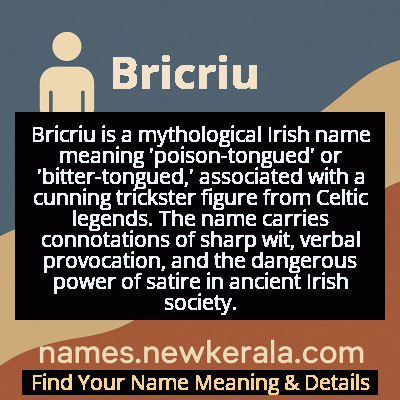Bricriu Name Meaning & Details
Origin, Popularity, Numerology Analysis & Name Meaning of Bricriu
Discover the origin, meaning, and cultural significance of the name BRICRIU. Delve into its historical roots and explore the lasting impact it has had on communities and traditions.
Name
Bricriu
Gender
Male
Origin
Celtic
Lucky Number
8
Meaning of the Name - Bricriu
Bricriu is a mythological Irish name meaning 'poison-tongued' or 'bitter-tongued,' associated with a cunning trickster figure from Celtic legends. The name carries connotations of sharp wit, verbal provocation, and the dangerous power of satire in ancient Irish society.
Bricriu - Complete Numerology Analysis
Your Numerology Number
Based on Pythagorean Numerology System
Ruling Planet
Saturn
Positive Nature
Ambitious, efficient, realistic, and authoritative.
Negative Traits
Materialistic, stressed, confrontational, and can be overly ambitious.
Lucky Colours
Dark blue, black.
Lucky Days
Saturday.
Lucky Stones
Blue sapphire, amethyst.
Harmony Numbers
2, 4, 6.
Best Suited Professions
Business leaders, managers, financial services, law enforcement.
What People Like About You
Leadership, determination, organizational skills.
Famous People Named Bricriu
Bricriu Nemthenga
Mythological Figure
Infamous trickster and satirist who instigated conflicts among Ulster heroes
Bricriu mac Carbada
Mythological Character
Master of satire and verbal provocation in medieval Irish literature
Name Variations & International Equivalents
Click on blue names to explore their detailed meanings. Gray names with will be available soon.
Cultural & Historical Significance
Historically, Bricriu's significance extends beyond mere villainy; he represents important social functions in Celtic culture. As a satirist, he tests the heroes' virtues and exposes their flaws, serving as an agent of social critique. His provocations force characters to confront their limitations and grow through adversity. The name Bricriu has become synonymous with provocative wit and the complex relationship between language, power, and social dynamics in Celtic tradition, making it a rich subject for understanding ancient Irish values around speech, honor, and community.
Extended Personality Analysis
Individuals associated with the name Bricriu typically exhibit exceptional verbal intelligence and a sharp, often provocative wit. They possess a natural talent for observation and analysis, quickly identifying weaknesses in arguments and social situations. This perceptiveness can make them brilliant critics and strategists, but may also lead to tendencies toward cynicism and manipulation. Their speech tends to be direct and incisive, sometimes bordering on harsh, as they value truth-telling over social harmony. They thrive in environments that reward intellectual challenge and verbal sparring.
Despite their sometimes abrasive exterior, Bricriu-types often have a complex moral compass and deep understanding of human nature. They may use their provocative nature to test people's character or push them toward personal growth, much like the mythological figure who forced heroes to confront their flaws. Their greatest challenge lies in balancing their natural skepticism with compassion and learning to use their verbal talents constructively. When matured, these individuals can become powerful advocates for truth and social change, using their sharp tongues to challenge injustice rather than simply creating conflict.
Modern Usage & Popularity
In contemporary naming practices, Bricriu remains an exceptionally rare choice, primarily confined to families with strong connections to Irish heritage, mythology enthusiasts, and academic circles focused on Celtic studies. The name has never appeared on popular baby name charts and maintains its status as a distinctive literary and historical reference rather than a mainstream option. Its usage is most common in Ireland among families actively preserving Gaelic naming traditions, though even there it represents a bold choice due to its association with a morally ambiguous trickster figure. The name occasionally appears in creative contexts such as character names in fantasy literature, role-playing games, and historical fiction, where its mythological resonance adds depth and cultural authenticity. Its continued rarity reflects both the challenging nature of its 'poison-tongued' association and the general trend toward more accessible Celtic names in modern usage.
Symbolic & Spiritual Meanings
Symbolically, Bricriu represents the transformative power of conflict and the dangerous potential of eloquence when divorced from ethical purpose. The name embodies the trickster archetype found across world mythologies - a figure who disrupts social order to expose hypocrisy and force growth through adversity. It symbolizes the Celtic understanding of words as active forces that can literally reshape reality, reflecting the ancient belief that satire could cause physical harm. Bricriu serves as a cautionary symbol about the responsibilities that accompany verbal skill and the importance of aligning eloquence with moral intention. The name also represents the necessary role of provocation in social evolution, suggesting that progress often requires challenging comfortable assumptions and testing established boundaries through difficult conversations and confrontational truth-telling.

